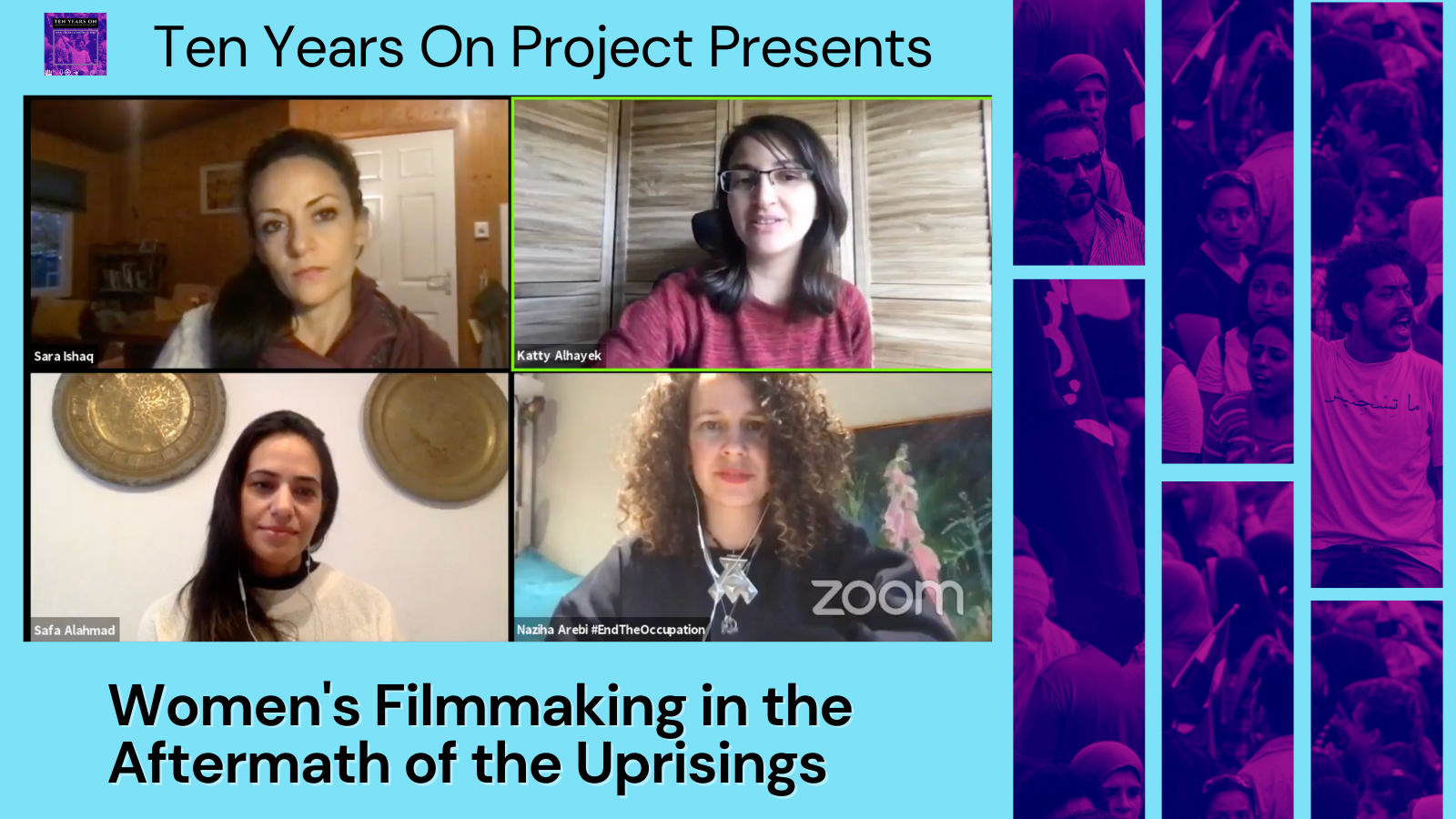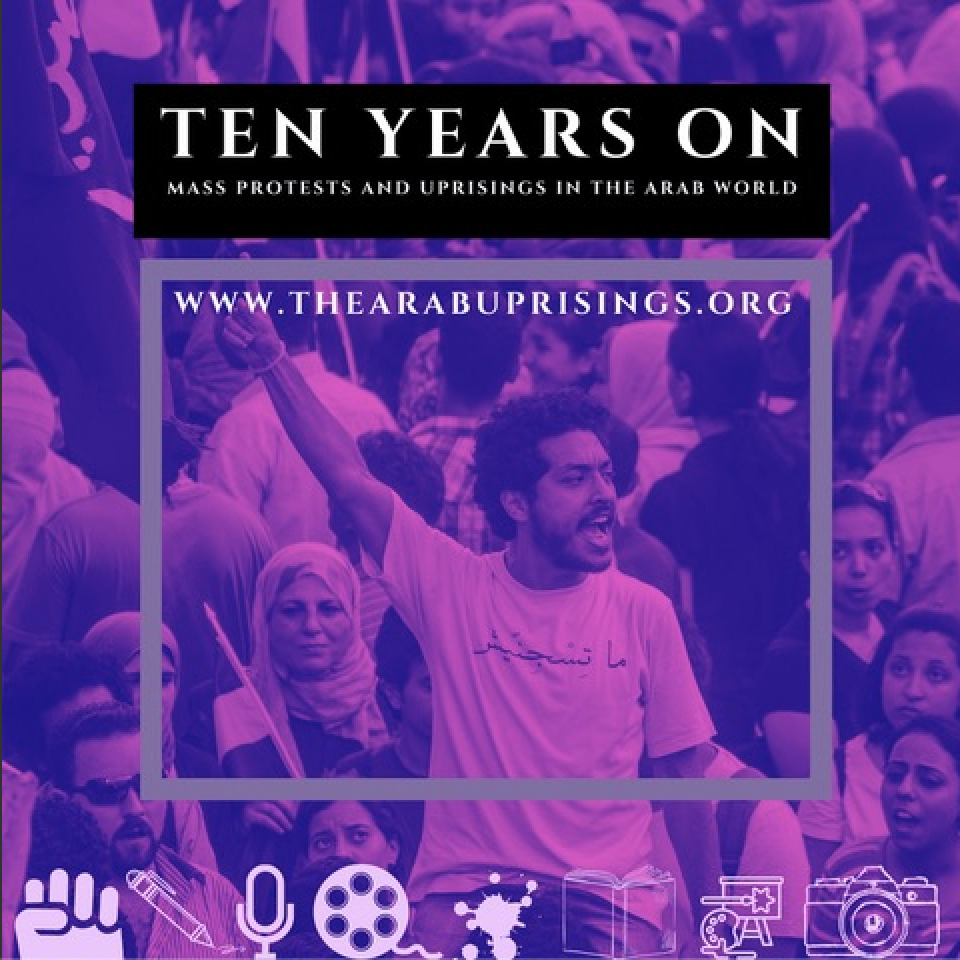The Georgetown University Center for Contemporary Arab Studies
and the Ten Years On Project Present
Ten Years On:
Women's Filmmaking in the Aftermath of the Uprisings
This is event is part of the
Ten Years On: Mass Protests and Uprisings in the Arab World Project
For more information, go to thearabuprisings.com
Organized by the Georgetown University Center for Contemporary Arab Studies and co-sponsored by the Arab Studies Institute
Featuring
Naziha Arebi
Sara Ishaq
Safa al-Ahmad
Katty Alhayek

The Center for Contemporary Arab Studies at Georgetown University and the Ten Years On Project hosted an online panel discussion with prominent Arab women filmmakers who have documented the aftermath of the 2011 Arab Uprisings, in the region capturing both pivotal moments and everyday life in Yemen, Libya, and Saudi Arabia.
Featuring
Naziha Arebi is a Libyan-British director, producer, writer, and artist who was born in 1984 to an English mother and Libyan father and was raised in Hastings. She is well-recognized for directing and producing award-winning Freedom Fields, which premiered at the 2018 Toronto International Film Festival (TIFF), and other movie projects.f Her photography and writing has also been published in multiple newspapers and magazines. Naziha's films have been shown at multiple more film festivals, including Arab Film Festival USA, Edinburgh International Film Festival, Venice International Film Festival, and the Tripoli Film Festival. Her writings and photography have also been published in multiple magazines and newspapers. She also works with many organizations such as UN Women and BBC Media Action.
Sara Ishaq is a Yemeni-Scottish film director. Ishaq directed and produced the critically acclaimed film Karama Has No Walls (2012). The short film was nominated for an Academy Award for Best Documentary (Short Subject) and BAFTA Scotland New Talents award. In 2013, her award-winning feature film The Mulberry House, which deals with her relationship with her family against the backdrop of the 2011 Yemeni uprising, premiered at IDFA.
Safa al-Ahmad is a Saudi Arabian journalist and filmmaker. She has directed documentaries for PBS and the BBC focusing on uprisings in the Middle East. On November 19, 2019, she was awarded the Wallenberg Medal at the University of Michigan. She was the joint winner of the 2015 Index on Censorship Freedom of Expression Award for Journalism and was a finalist for the 2014 Sony Impact Award.
Dr. Katty Alhayek (organizer and moderator) is an Assistant Teaching Professor in the Center for Contemporary Arab Studies at Georgetown University (USA) and an incoming Assistant Professor in the School of Professional Communication at Ryerson University (Canada). Alhayek’s research centers around themes of marginality, media, audiences, gender, intersectionality, and displacement in a transnational context. Alhayek completed her Ph.D. in Communication at the University of Massachusetts Amherst with a graduate certificate in Advanced Feminist Studies. Her publications include articles in the International Journal of Communication; Feminist Media Studies; Gender, Technology and Development; Syria Studies; and Participations: Journal of Audience and Reception Studies.
Ten Years On
Mass Protests and Uprisings in the Arab World
This event is part of the Ten Years on Project, a year-long series of events, reflections, and conversations created to commemorate the tenth anniversary of the start of the Arab uprisings in Tunisia. We launched this project in order to interrogate and reflect on the uprisings, with the hope of producing resources for educators, researchers, students, and journalists to understand the last decade of political upheaval historically and in the lived present.
Watch all of our previous Ten Years on events here:

